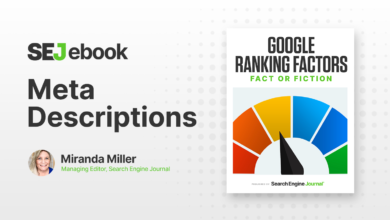Google And The Right To Be Forgotten

Have you ever googled yourself and found incorrect or outdated information?
This may be ancient history, and no longer reflects who you are today, but it still appears prominently in Google search results.
Everyone makes mistakes. Should someone be penalized for this mistake years or decades later because of websites indexed on search engines like Google?
Many countries, including those in the European Union, support the protection of the “right to be forgotten”. (RTBF)
It is the ability of a person to request Google deindex pages that refer to their names or specific incidents related to them.
The information is still on the original sites, but it won’t appear in the Google index, so it’s less likely to be seen.
Google recently posted a video reminding people of this law, along with step-by-step instructions showing how to request removal of content under the right to be forgotten.
Here’s more about RTBF, along with key points from the Google video.
What constitutes a “right to be forgotten?”
Exact laws vary for each country that supports RTBF, but the concept is that personal information about a person can be removed from search results under certain circumstances.
For example, a person has committed a crime, has been convicted, and has served his sentence. After a few decades, they want to apply for a job, but an internet search turns up their arrest. The employer passes off the potential employee even though he has since lived a legal life.
There is a conflict between the right to privacy and freedom of expression. In 2014, an EU judge set a precedent when a Spanish lawyer wanted to de-index websites that referenced a past religion, according to Middle Tennessee State University.
There are many reasons why a person might want search pages removed, including scandal, embarrassment, bad judgments, etc., or anything that could get in the way of them living a normal life.
The UK has the Rehabilitation of Offenders Act which states that criminal convictions should not be considered after a specific time frame for conditions such as employment and insurance. In the rules of American transparency and the right to freedom of expression are paramount, but in European Union RTBF It is a human right.
The following criteria are used to determine if an application is eligible for the RBTF:
- Is the information accurate?
- Is the information not enough?
- Is the information irrelevant?
- Is the information exaggerated?
- Is there a public interest in providing the information?
How to remove information
If you’re in a country that allows RTBF, anyone can ask Google to remove certain pages for a specific search query, such as a name. This does not mean that pages will not appear for other search queries.
The United States does not recognize the “right to be forgotten” because it conflicts with First Amendment rights and freedom of speech.
No one can apply for removal if they created the content. If someone creates a website or social media account, they can make changes to the security setting or remove the website. The site must be from another such as a news organization.
The first step is the visit g.co/legal and choose Google search. You must provide evidence that you are the person involved in the pages.
Check personal information and “right to be forgotten” for the reason for removal. Fill in all required information including website address, personal information, and specific search queries. The more information available, the better Google will decide.
Google sends you an email to verify that the request has been received and then begins the decision-making process. The process is not automatic and at least one reviewer bypasses the request, but the amount of time it takes to make a decision depends on the request.
The bigger problem is how the demand affects the public interest versus privacy rights. For example, if a major public figure involved in a scandal wants to take down websites, the result will be negative due to public interest and information.
Other factors include:
- role in public life
- Where does the information come from
- How old is she?
- Privacy problems
If the request is approved, only URLs from the respective countries are removed. If someone from the European Union requests URLs be removed, then Google removes them from the lists of EU countries, but not from the US or other countries.
If the application is denied, the person can file an appeal with the country’s data privacy department.
Offense to RBTF
Reputation management is big business and not everyone uses RTBF as well as they should. There have been attempts by some to submit multiple applications from different angles to increase the chances of approval.
Companies that received negative reviews also attempted to remove URLs, but those were generally unsuccessful.
What if you are in the US or another non-RBTF country?
Google allows people to file requests in the United States, but the petitioner must describe the law that allows them to remove the URLs. In the United States, there is some protection for the victim of revenge porn. In general, there isn’t much to be done when it comes to writing off pages in non-RBTF companies.
This is still a hot issue and lawmakers continue to debate the legality of information privacy, so this is likely to change in the future.
Featured image: Ascannio/Shutterstock




